Connect With Us
Blog
Items filtered by date: October 2023
Children’s Toe Wounds
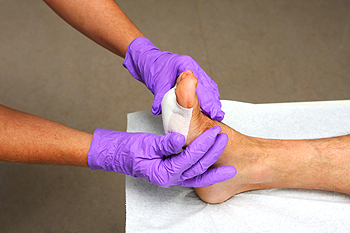
An open wound on the toe involves a disruption in the skin, ranging from a superficial cut to a more serious injury that impacts the deeper structures like tendons, muscles, ligaments, nerves, blood vessels, and bone. For minor wounds, basic first aid is usually sufficient. However, if the toe wound is deep, has a wide opening, or exhibits persistent bleeding, immediate attention by a podiatrist is necessary. In such cases, the podiatrist may use stitches or medical tape to close the wound. It is particularly important to be vigilant about wounds on the toes, as our feet are often exposed to dirt and bacteria, making them more susceptible to infection. Once a child has been treated for a toe wound, it is imperative to adhere strictly to the podiatrist's guidelines to prevent infection and minimize the potential for scarring. If your child has sustained a toe wound and it is more than a minor scrape, it is strongly suggested that you make an appointment with a podiatrist for treatment.
Wound care is an important part in dealing with diabetes. If you have diabetes and a foot wound or would like more information about wound care for diabetics, consult with Dr. Richard Silverstein from Union Foot Care. Our doctor will assess your condition and provide you with quality foot and ankle treatment.
What Is Wound Care?
Wound care is the practice of taking proper care of a wound. This can range from the smallest to the largest of wounds. While everyone can benefit from proper wound care, it is much more important for diabetics. Diabetics often suffer from poor blood circulation which causes wounds to heal much slower than they would in a non-diabetic.
What Is the Importance of Wound Care?
While it may not seem apparent with small ulcers on the foot, for diabetics, any size ulcer can become infected. Diabetics often also suffer from neuropathy, or nerve loss. This means they might not even feel when they have an ulcer on their foot. If the wound becomes severely infected, amputation may be necessary. Therefore, it is of the upmost importance to properly care for any and all foot wounds.
How to Care for Wounds
The best way to care for foot wounds is to prevent them. For diabetics, this means daily inspections of the feet for any signs of abnormalities or ulcers. It is also recommended to see a podiatrist several times a year for a foot inspection. If you do have an ulcer, run the wound under water to clear dirt from the wound; then apply antibiotic ointment to the wound and cover with a bandage. Bandages should be changed daily and keeping pressure off the wound is smart. It is advised to see a podiatrist, who can keep an eye on it.
If you have any questions, please feel free to contact our office located in Havre de Grace, MD . We offer the newest diagnostic and treatment technologies for all your foot care needs.
Treating and Preventing Plantar Warts
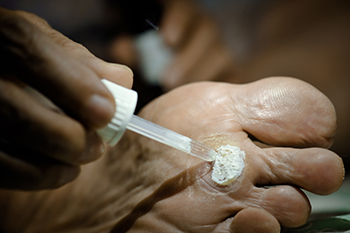
Plantar warts, painful growths that appear on the soles of the feet, can be an unwelcome annoyance. However, there are effective ways to treat and prevent this viral infection. To tackle existing plantar warts, salicylic acid prescribed by a podiatrist may gradually help to dissolve the wart tissue. For stubborn or painful warts, a podiatrist can recommend cryotherapy, laser therapy, or surgical removal. To prevent plantar warts, maintaining proper foot hygiene is essential. Keep your feet clean and dry, and avoid walking barefoot in public places to minimize exposure to infection. Wear shoes that fit well, and change your socks daily. If you have a cut or scrape on your foot, cover it with a bandage to prevent the virus from entering. Finally, boost your immune system through a healthy diet, exercise, and stress management, as a strong immune system can help ward off the human papilloma virus, or HPV, responsible for these warts. If you have developed a plantar wart, it is strongly suggested that you are under the care of a podiatrist who can provide appropriate relief treatments.
Plantar warts can be very uncomfortable. If you need your feet checked, contact Dr. Richard Silverstein from Union Foot Care. Our doctor will assist you with all of your foot and ankle needs.
About Plantar Warts
Plantar warts are the result of HPV, or human papillomavirus, getting into open wounds on the feet. They are mostly found on the heels or balls of the feet.
While plantar warts are generally harmless, those experiencing excessive pain or those suffering from diabetes or a compromised immune system require immediate medical care. Plantar warts are easily diagnosed, usually through scraping off a bit of rough skin or by getting a biopsy.
Symptoms
- Lesions on the bottom of your feet, usually rough and grainy
- Hard or thick callused spots
- Wart seeds, which are small clotted blood vessels that look like little black spots
- Pain, discomfort, or tenderness of your feet when walking or standing
Treatment
- Freezing
- Electric tool removal
- Laser Treatment
- Topical Creams (prescription only)
- Over-the-counter medications
To help prevent developing plantar warts, avoid walking barefoot over abrasive surfaces that can cause cuts or wounds for HPV to get into. Avoiding direct contact with other warts, as well as not picking or rubbing existing warts, can help prevent the further spread of plantar warts. However, if you think you have developed plantar warts, speak to your podiatrist. He or she can diagnose the warts on your feet and recommend the appropriate treatment options.
If you have any questions please feel free to contact our office located in Havre de Grace, MD . We offer the newest diagnostic and treatment technologies for all your foot and ankle needs.
Varicose Veins in the Feet and Ankles
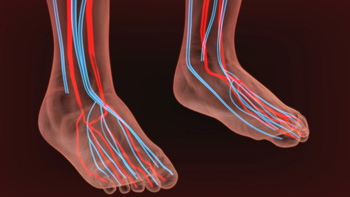
Varicose veins that appear in the feet and ankles are known as corona phlebectasia in the medical field. Corona describes the fan-like pattern of these abnormal capillaries, resembling rays radiating from the sun. Phlebectasia signifies the presence of abnormal veins and capillaries. These veins often result from venous reflux or insufficiency, where blood flows backward due to valve failure in the veins. Patients with prominent ankle veins or corona phlebectasia typically have underlying venous insufficiency in the lower leg. Patients may present with visible veins alone, visible veins with symptoms, or symptoms alone. Ankle and foot varicosities should be examined for underlying issues. Timely treatment is important because untreated varicose veins can lead to symptoms such as leg aches, itching, swelling, and skin conditions, including ulceration and blood clots. If you have varicose veins in your feet or ankles, it is suggested that you make an appointment with a podiatrist for an examination and any treatment that is deemed necessary.
Poor circulation is a serious condition and needs immediate medical attention. If you have any concerns with poor circulation in your feet contact Dr. Richard Silverstein of Union Foot Care. Our doctor will treat your foot and ankle needs.
Poor Circulation in the Feet
Poor blood circulation in the feet and legs is can be caused by peripheral artery disease (PAD), which is the result of a buildup of plaque in the arteries.
Plaque buildup or atherosclerosis results from excess calcium and cholesterol in the bloodstream. This can restrict the amount of blood which can flow through the arteries. Poor blood circulation in the feet and legs are sometimes caused by inflammation in the blood vessels, known as vasculitis.
Causes
Lack of oxygen and oxygen from poor blood circulation restricts muscle growth and development. It can also cause:
- Muscle pain, stiffness, or weakness
- Numbness or cramping in the legs
- Skin discoloration
- Slower nail & hair growth
- Erectile dysfunction
Those who have diabetes or smoke are at greatest risk for poor circulation, as are those who are over 50. If you have poor circulation in the feet and legs it may be caused by PAD and is important to make changes to your lifestyle in order to reduce risk of getting a heart attack or stroke. Exercise and maintaining a healthy lifestyle will dramatically improve conditions.
As always, see a podiatrist as he or she will assist in finding a regimen that suits you. A podiatrist can also prescribe you any needed medication.
If you have any questions please feel free to contact our office located in Havre de Grace, MD . We offer the newest diagnostic and treatment technologies for all your foot and ankle needs.
Arthritis Can Cause Pain in the Feet and Ankles
Alternatives to Flip-Flops
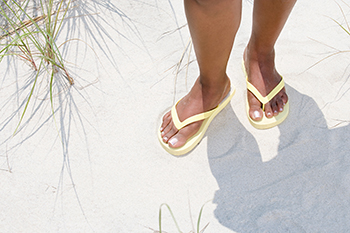
If you are a fan of flip-flops, it is essential to consider their impact on foot health. While these airy sandals are convenient, they may not be the best choice of footwear because they offer minimal arch support, heel cushioning, and shock absorption, possibly leading to foot discomfort and pain. Wearing flip-flops forces your toes to grip tightly to keep the sandals on. Over time, this can lead to conditions such as hammertoe, where toes become permanently bent. Researchers have found that flip-flops can change your natural walking pattern, potentially causing pain and problems from your feet up to your hips and lower back. The majority of flip-flops have thin soles that offer little foot protection. This can result in increased heel-strike impact and foot discomfort. Flip-flops can also increase the risk of falls and injuries due to their minimal attachment to the feet. Substitutes for flip-flops that are better for your feet should fit snugly without being too tight, provide proper arch and heel support, and have ankle straps or toe rests to prevent slipping. In general, flat-soled shoes are not ideal for foot health. If you desire the comfort and ease of flip-flops but want to protect your feet, it is suggested that you make an appointment with a podiatrist for recommendations
Flip-flops are not always the best choice of footwear. If you have any concerns about your feet or ankles, contact Dr. Richard Silverstein from Union Foot Care. Our doctor will assist you with all of your foot and ankle needs.
Flip-Flops and Feet
When the weather starts warming up, people enjoy wearing flip-flops. Flip-flops are comfortable, stylish, and easy to slip on and off; they're perfect for any summer beach goer. However, these shoes can cause harm to the feet.
How Can Flip-Flops Affect Me Long-Term?
- Ankle problems
- Hip problems
- Lower back problems
- Pain in the balls of the feet
- Problems with foot arches
- Changes in the way you walk
Are There Injuries Associated with Flip-Flops?
Yes. Since flip-flops are relatively weak and do not provide the same amount of support as sneakers, people who wear flip-flops regularly are more susceptible to injuries. On top of that, the open nature of the shoe makes your feet more prone to other problems, such as cuts and even infections. Common injuries and ailments include:
- Sprained ankles
- Blisters
- Infections
- Cuts and Scrapes
I like Wearing Flip-Flops. Are There Safe Alternatives?
When buying flip-flops, try to find ones that have sturdy soles and that are made of high-quality materials that will support for your feet. These flip-flops will cost more but will also last longer as a result.
If you have any questions please feel free to contact our office located in Havre de Grace, MD . We offer the newest diagnostic and treatment technologies for all your foot and ankle needs.
Consideration of Orthotics
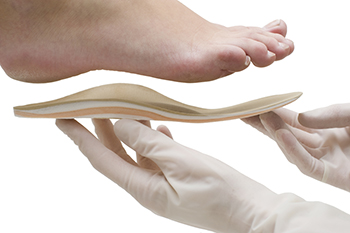
Orthotic shoe devices are inserts made of various materials consisting of rubber, leather, or plastic that are placed inside shoes. They serve to stabilize the foot in a neutral position and provide cushioning to reduce impact. Custom-made orthotics can be beneficial for individuals with unique foot shapes or excessive pronation, which is an inward rolling of the foot. Investing in well-constructed athletic shoes with good arch support and heel cushioning, along with softer arch supports and heel cups, can also help to alleviate foot discomfort and absorb shock. If you suffer from foot pain and would like to see if orthotics may help you, it is suggested that you make an appointment with a podiatrist for a consultation.
If you are having discomfort in your feet and would like to try orthotics, contact Dr. Richard Silverstein from Union Foot Care. Our doctor can provide the care you need to keep you pain-free and on your feet.
What Are Orthotics?
Orthotics are inserts you can place into your shoes to help with a variety of foot problems such as flat feet or foot pain. Orthotics provide relief and comfort for minor foot and heel pain but can’t correct serious biomechanical problems in your feet.
Over-the-Counter Inserts
Orthotics come in a wide variety of over-the-counter inserts that are used to treat foot pain, heel pain, and minor problems. For example, arch supports can be inserted into your shoes to help correct overarched or flat feet, while gel insoles are often used because they provide comfort and relief from foot and heel pain by alleviating pressure.
Prescription Orthotics
If over-the-counter inserts don’t work for you or if you have a more severe foot concern, it is possible to have your podiatrist prescribe custom orthotics. These high-quality inserts are designed to treat problems such as abnormal motion, plantar fasciitis, and severe forms of heel pain. They can even be used to help patients suffering from diabetes by treating foot ulcers and painful calluses and are usually molded to your feet individually, which allows them to provide full support and comfort.
If you are experiencing minor to severe foot or heel pain, it’s recommended to speak with your podiatrist about the possibilities of using orthotics. A podiatrist can determine which type of orthotic is right for you and allow you to take the first steps towards being pain-free.
If you have any questions please contact our office located in Havre de Grace, MD . We offer the newest diagnostic and treatment technologies for all your foot and ankle needs.
Blog Archives
- July 2024
- June 2024
- May 2024
- April 2024
- March 2024
- February 2024
- January 2024
- December 2023
- November 2023
- October 2023
- September 2023
- August 2023
- July 2023
- June 2023
- May 2023
- April 2023
- March 2023
- February 2023
- January 2023
- December 2022
- November 2022
- October 2022
- September 2022
- August 2022
- July 2022
- June 2022
- May 2022
- April 2022
- March 2022
- February 2022
- January 2022
- December 2021
- November 2021
- October 2021
- September 2021
- August 2021
- July 2021
- June 2021
- May 2021
- April 2021
- March 2021
- February 2021
- January 2021
- December 2020
- November 2020
- October 2020
- September 2020
- August 2020
- July 2020
- June 2020
- May 2020
- April 2020
- March 2020
- February 2020
- January 2020
- December 2019
- November 2019
- October 2019
- September 2019
- August 2019
- July 2019
- June 2019
- May 2019
- April 2019
- March 2019
- February 2019
- January 2019
- December 2018
- November 2018
- October 2018
- September 2018
- August 2018
- July 2018
- June 2018
- May 2018
- April 2018
- March 2018
- February 2018
- January 2018
- December 2017
- November 2017
- October 2017
- September 2017
- August 2017
- July 2017
- June 2017
- May 2017
- April 2017
- March 2017
- February 2017
- January 2017
- December 2016
- November 2016
- October 2016
- September 2016
- August 2016
- July 2016
- June 2016
- May 2016

